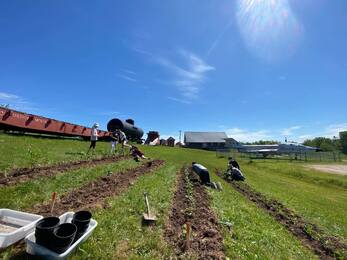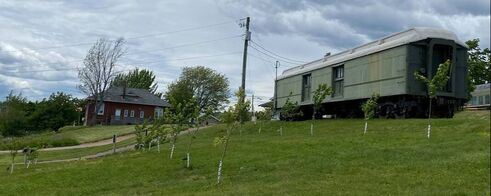 Image by Tessa Wissink
Image by Tessa Wissink Hello! My name is Tessa Wissink and I am 28 years old. Over the past five years, I have become increasingly interested in the intersection of food, environmentalism and quality of life. I have found the experiences of starting to grow my own food at home, foraging for wild food, and learning to hunt, trap and fish extremely rewarding. I feel a much greater connection to the food I eat and the land around me, much more than I ever had before, and would like to share these experiences with others wherever and whenever I can.
Food forests incorporate plants that produce food for humans, such as fruit and nut trees, shrubs, herbs, vines and perennial vegetables. In contrast with regular com- munity gardens, food forests are almost completely self- sustainable ecosystems (once established) and provide the greatest yield of food for the least amount of effort and maintenance. I believe this food forest will provide an important space for the community and surrounding areas where many families experience food insecurity. Food forests, much like natural forest ecosystems, take time to go through the stages of ecological succession. This funding will be used to help kick-start the project, but the goal is for the project to continue and grow for many years. With the proper investment of time and care, the food forest will not only produce local, sustainable food, but it will also provide an educational greenspace. Urban greenspaces provide a multitude of positive benefits including benefits for physical and mental health (e.g., reduction of stress, lower blood pressure, improved mental function, increased immune function, etc.). Anyone will be able to access the food forest at any time of year to learn about growing their own food, pollinators and the functioning of healthy forest ecosystems. Community volunteers will act as stewards. The possibilities for community programs, partnerships, events and engagement are endless.
There is a clear link between access to healthy food and quality of life and I believe the current disconnect between people and the food they eat is dangerous to our health, our environment and our humanity overall. The importance of connecting people to where their food comes from cannot be overstated, especially during the current climate crisis.
If you would like to donate, learn more about food forests or volunteer, check out amplify.e-activist.com/15221/grow-green/114598/rural-new-brunswick-community-food-forest. We also welcome donations of gardening supplies, tools and plants. Please contact me at [email protected] if you have questions or concerns.

 RSS Feed
RSS Feed